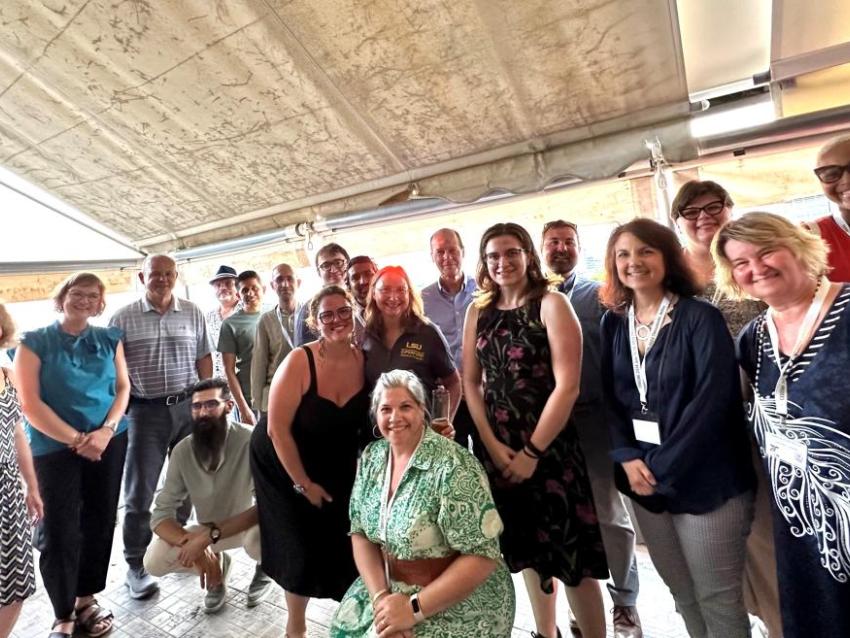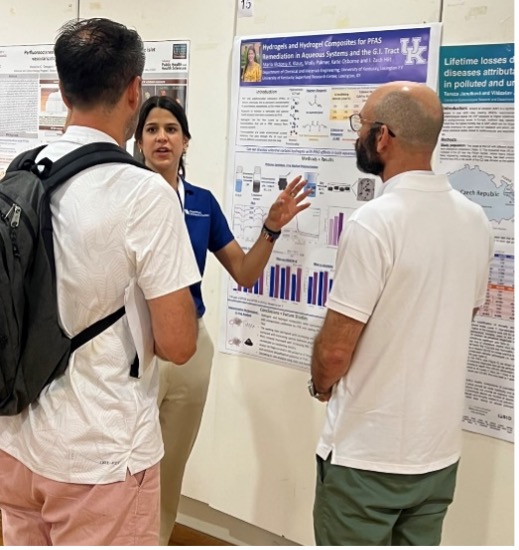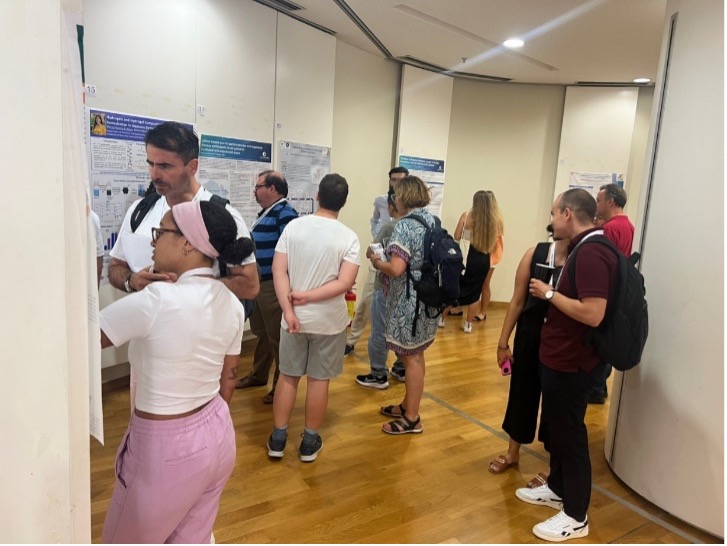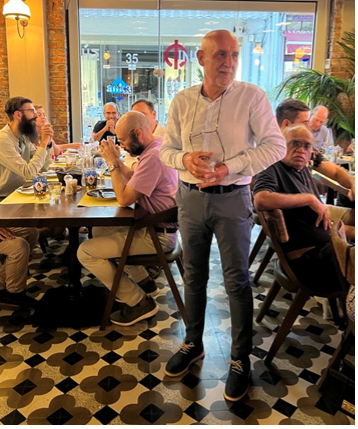
Cultivating research partnerships for environment and health innovations at East European Conference on Health and the Environment (CEECHE)
The University of Kentucky Superfund Research Center (UKSRC) and the University of Kentucky Department of Civil Engineering partnered with Aristotle University of Thessaloniki (Greece) to host the 20th anniversary Central and Eastern European Conference on Health and the Environment (CEECHE). This year’s theme, “Seeking Solutions for Environmental Exposures and Disease Risks”, brought approximately 100 researchers from 16 countries together from July 15 to 19, 2024, to focus on developing solution-oriented research and collaborations to grapple with common, yet increasingly complex, challenges associated with legacy and emerging pollution.
Sponsored by the National Institute of Environmental Health Sciences (NIEHS), Aristotle University of Thessaloniki, the Department of Civil Engineering from the University of Kentucky’s Stanley and Karen Pigman College of Engineering, and ALS Global, the conference CEECHE 2024 was held in Thessaloniki, Greece, located along the Aegean Sea, where environmental challenges have intensified environmental exposures and related disease risks
Researchers from seven NIEHS Superfund Research Program Centers presented scientific findings, as did scientists from USEPA’s Office of Research and Development (ORD). USEPA ORD’s Center for Public Health and Environmental Assessment organized a Human Health Risk Assessment Workshop.
“CEECHE is more than a conference,” noted Professor Kelly Pennell, 2024 CEECHE Conference Board Chair. “It is a community of scientists supporting each other as we strive to address issues that are oft overlooked and understudied. We share in-depth formal and informal conversations about ‘wicked’ environmental challenges each of our countries are facing and discuss possible solutions”. Earl Parker Robinson Chair Professor of Environment and Sustainability in the UK Department of Civil Engineering, added, “Listening to and learning from this community helps us make persistent progress solving real-world problems.”
Environmentally-induced diseases are responsible for nearly a quarter of all deaths globally. Scientific Program Chairs Dr. Angela Gutiérrez, a Research Scientist at the UK Department of Civil Engineering, and Dr. Efstathios Oikonomou, an Assistant Professor at the School of Rural and Surveying Engineering at Aristotle University, therefore organized a scientific program that highlighted pressing environmental exposures that require characterization and prevention in Central and Eastern Europe and beyond. In Northern, Central, Eastern, and Southern European regions, environmental impacts are exacerbated by poor ambient air quality, high residual contamination of water and soils, chemical contamination by persistent organic pollutants (POPs), and long-distance transport of environmental contaminants such as per- and polyfluorinated alkyl substance (PFAS) and microplastics. Due to geopolitics and proximity to coastal and mountain regions, military-related pollution and climate-health links are also critical concerns for CEE countries.
The opening conference workshop, led by Dr. Gutiérrez, featured a panel of Fulbright scholars who shared their experiences and stories of sustained international partnerships. Prof. Michael Bloom, George Mason University, forged strong and lasting relationships with the Environmental Health Center (EHC) in Romania and recently established an educational exchange program with Babeș-Bolyai University. Prof. Nikiforos Stamatiadis, University of Kentucky Department of Civil Engineering, shared his deep and impactful connections with institutions in Italy and Greece -- relationships that provide countless opportunities for faculty and student interactions. In fact, Prof. Stamatiadis's connection with Aristotle University was critically crucial in CEECHE 2024 being held in Greece.
Throughout the conference, attendees learned from scientists across eight sessions, ranging in topics from “Exposomic Tools and Biostatistical Algorithms for Environmental Health” to “Removal of Legacy and Emerging Contaminants from Environmental Systems.” Beyond these sessions, the conference offered a field trip and two scientific panels: “Understanding Complex Environmental Exposures and Health Effects” and “Solutions to Prevent Environmental Exposures and Disease Risks.” A poster session highlighted necessary emerging research undertaken by graduate students and post-doctoral scholars.
CEECHE 2024 celebrated the contributions and leadership of key figures involved in the conception and inaugural conference in Prague, Czech Republic, in 2004 and their continued commitment to organizing and hosting subsequent events in Bratislava, Slovakia (2006), Cluj-Napoca, Romania (2008 and 2014), Prague, Czech Republic (2016), and Krakow, Poland (2018). Dr. Gutiérrez, who attended her first conference in 2016 as a graduate student, said “CEECHE holds a special place in my heart, where I have made many scientific and personal connections that continue to grow to this day. Attending CEECHE provides a unique lens through which to learn first-hand about the challenges each country faces regarding environmental exposures and understand how communities and scientists worldwide address these concerns, constrained by their social, economic, and political realities. This experience is central to the goal of CEECHE to provide contextualized approaches and multi-pronged solutions that help educate and expand the way we look at, understand, and respond to the global grand challenges affecting health and the environment.” Speaking on the significance of CEECHE 2024, Gutiérrez continued, “It was an honor to plan and work side-by-side with colleagues who have inspired and supported me throughout my scientific career. I cherish being able to create the 20th-anniversary awards and recognize the critical contributions of CEECHE leaders like Dr. Eugen Gurzau, currently an external consultant of the Environmental Health Center and also Professor at Babes-Bolyai University, Cluj-Napoca (Romania). Eugen’s interest in environmental health risk assessment across Romania, Europe, and the US, as well as his vast network of collaborators, were crucial in the conception of CEECHE, and his support continues to be unwavering ever since”.
The final day of CEECHE 2024 included Excellence in Research awards presentations honoring the next generation of scientists. Adjudicated by a panel of senior scientific experts, oral presentation honorees included Corina Konstantinou, Cyprus University of Technology (Cyprus), Nina Maria Ainali from Aristotle University of Thessaloniki (Greece), Stella Petromelidou from Aristotle University of Thessaloniki (Greece), and Dr. Stephanie Morgan from Wayne State University (USA), while poster presentation honorees were Maria Victoria Klaus from the University of Kentucky, Fernando Uriel González-Domínguez, The School of Public Health of Mexico (Mexico), Aurimas Rapalavicius, Vytautas Magnus University (Lithuania), and Krystal Ni, University of Rochester (USA).
As CEECHE 2024 drew to a close, Dr. Pennell and Dr. Konstantinos Makris, Professor of Environmental Health at Cyprus University of Technology, led a session featuring active dialogue among panelists and attendees about multinational opportunities for sharing lessons-learned regarding legacy contaminants, collaborating on research regarding emergency contaminants, and continuing to strengthen an international environmental health sciences community of practice that centers mutual respect, co-learning, and partnership.
***CEECHE is a cooperative initiative established in 2004 between US and European institutions to promote scientific exchange about complex and common links between health and the environment worldwide, especially within CEE countries. ***







